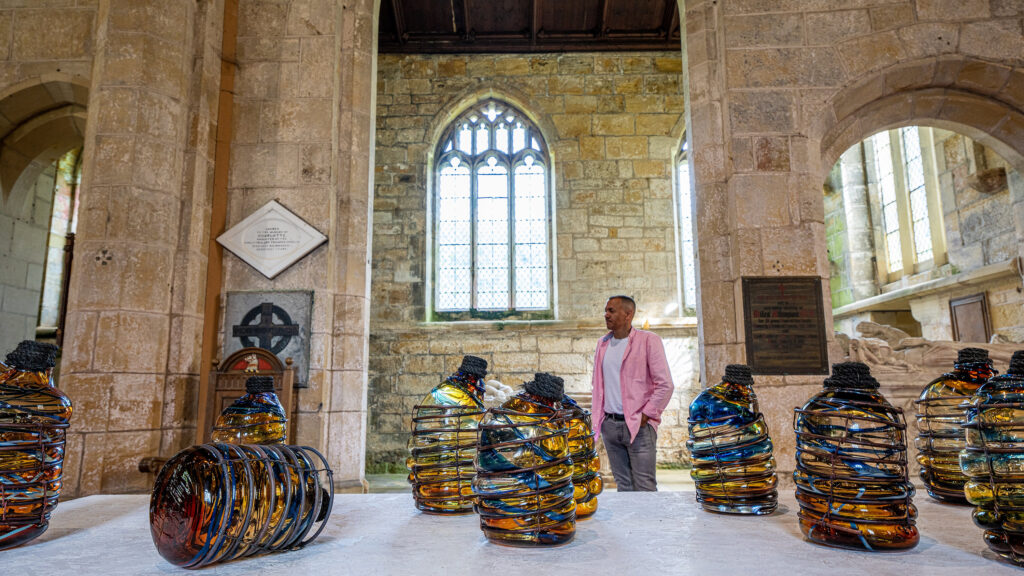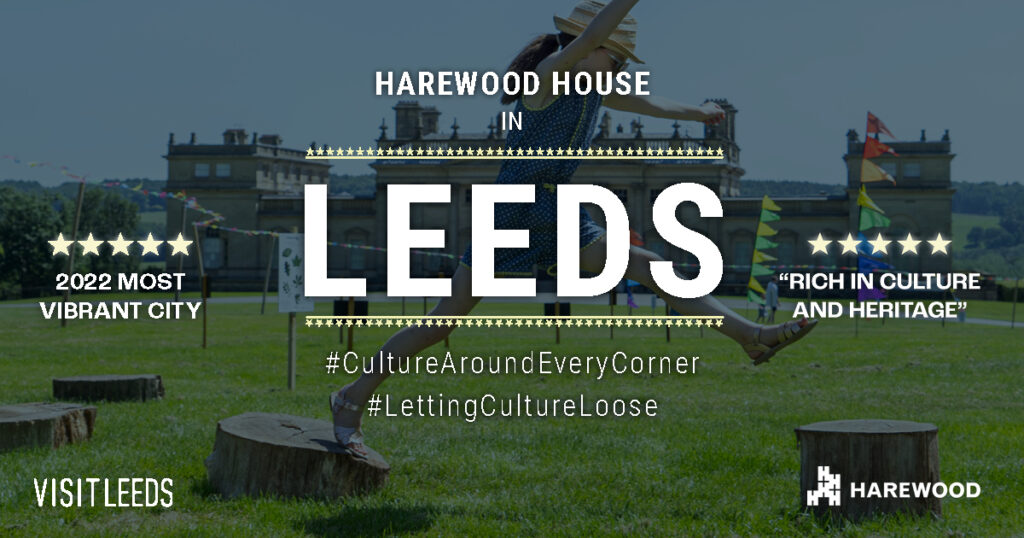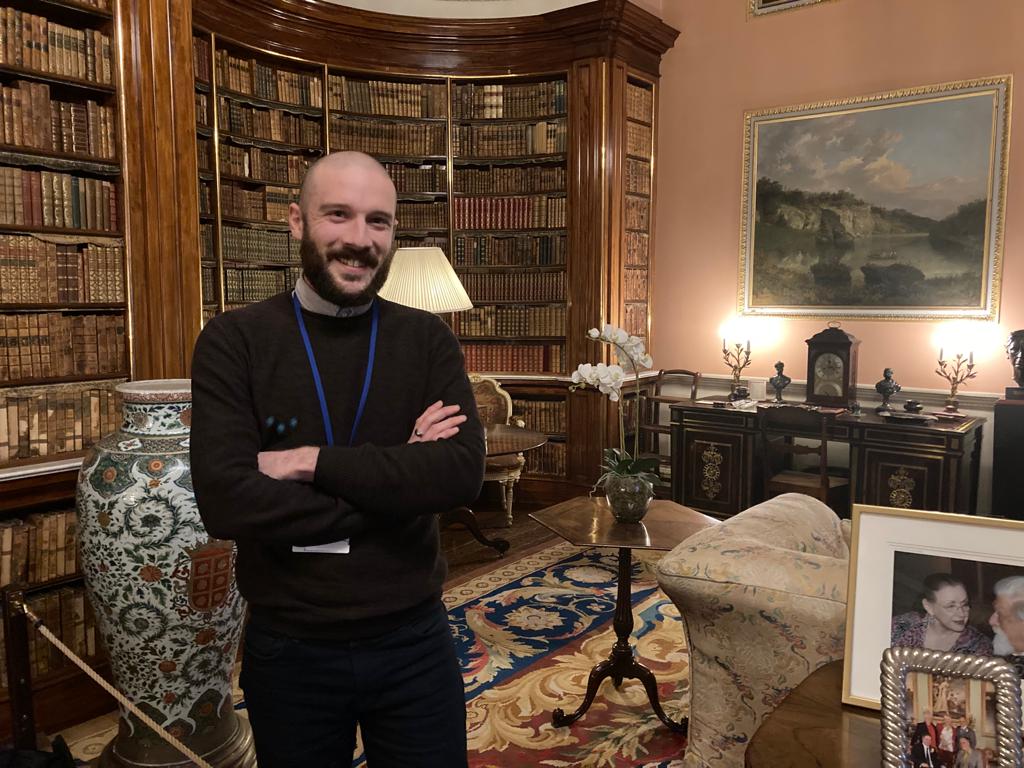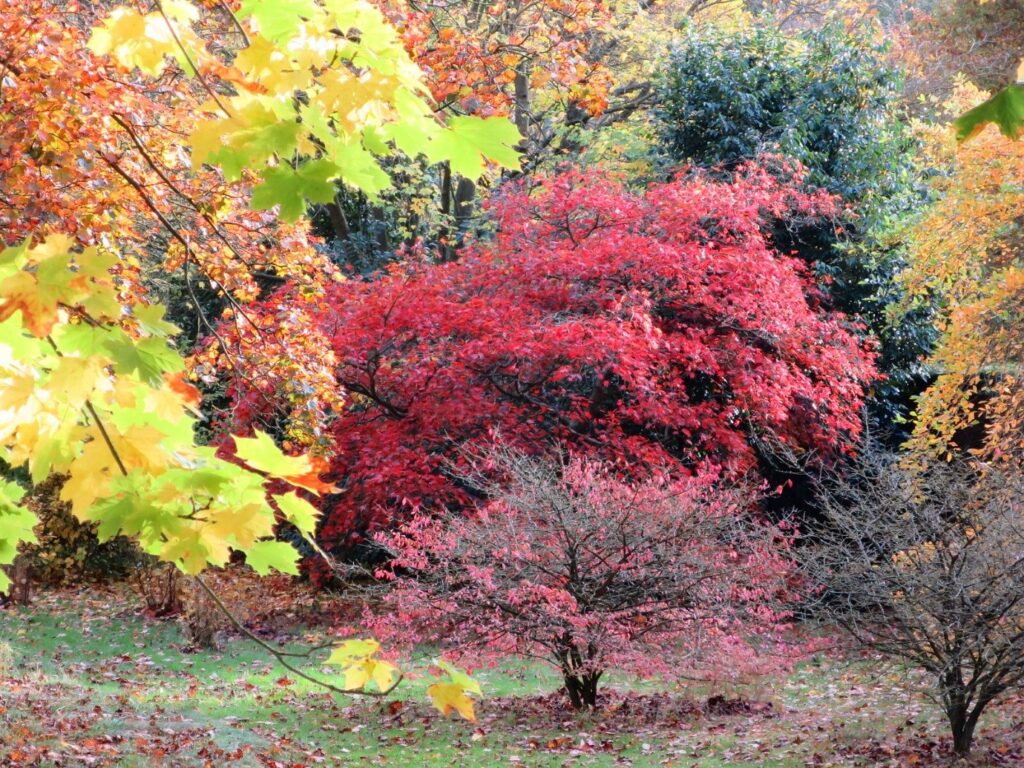
The West Garden at Harewood
During the COP26 climate change conference in Glasgow, the horticulture industry, alongside agriculture and many others, will be presenting its sustainability targets and demonstrating the progress being made towards net zero. Sustainable food production, urban tree planting, reduction in the use of peat, investment in renewable energy, increasing circularity in horticultural plastics and the responsible management of water resources are among many environmental issues affecting the horticulture industry that will be discussed at the climate change summit.
The role of Gardens
Gardens are vital to our health and wellbeing, as well as to the health of the planet. They provide space for relaxation, exercise and play, as well as for the growing of beautiful plants and nutritious food. Crucially, gardens also serve as valuable havens for wildlife and so are environmentally and ecologically important. It is estimated that UK gardens cover a total area of over 430,000 hectares – more than four times the total area of our National Nature Reserves*. And with the number of gardening enthusiasts in Britain now at 30 million*, there is a huge potential for gardeners to collectively play a major role in mitigating the impact of climate change. This can be done in many ways by adapting our gardening methods to reduce our carbon footprint, planting more trees and shrubs, and creating more wildlife habitats in our gardens to support biodiversity.
How are the gardens at Harewood contributing to the climate change emergency?
Soil
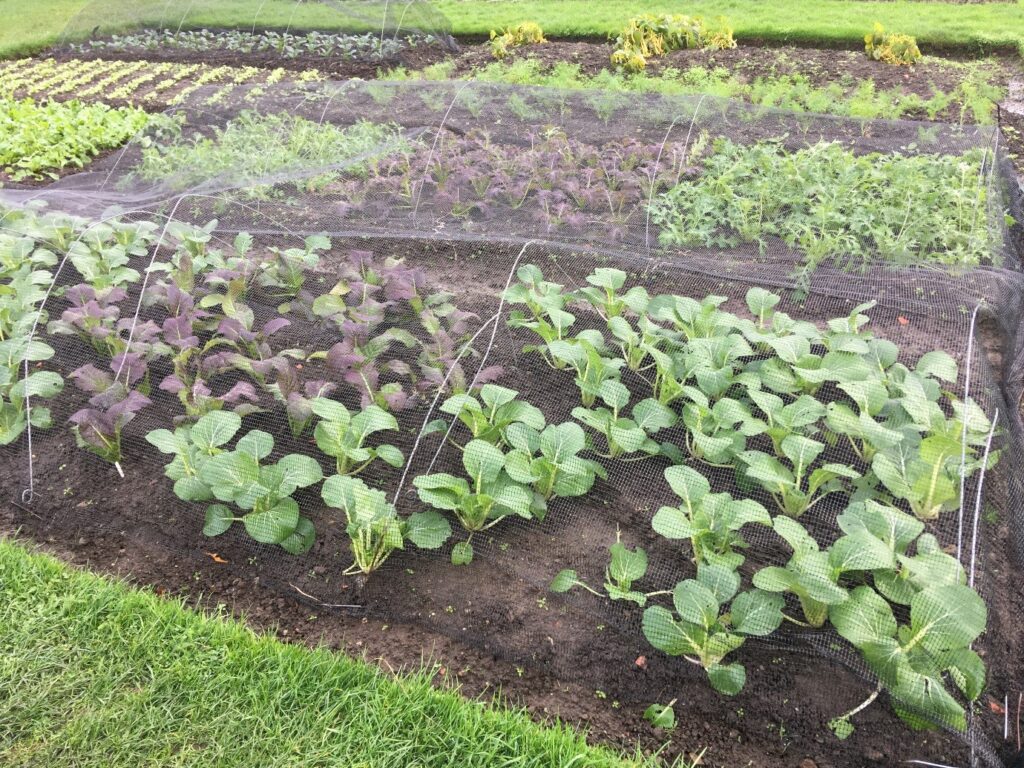
Crops being grown by the ‘no-dig’ method in the Harewood Walled Garden
Soil stores carbon captured from the atmosphere through plant photosynthesis. Soils generally contain about three times more carbon than the atmosphere. When soil is dug over, this carbon is released back into the atmosphere. The action of digging over the soil also destroys the intricate networks of beneficial fungi, microbes and organisms living in the soil. This symbiotic ecosystem of soil-borne organisms is known as the ‘soil food web’ and is vital to plant health, as well as to the health of the planet.
At Harewood, we use ‘no-dig’ methods to grow food crops in the kitchen garden. Instead of digging the soil over and releasing the carbon into the atmosphere, we apply composted organic matter to the surface and allow the soil food web to break it down naturally, thereby locking in the carbon whilst protecting the ecology of the soil and feeding our crops in the process.
Peat
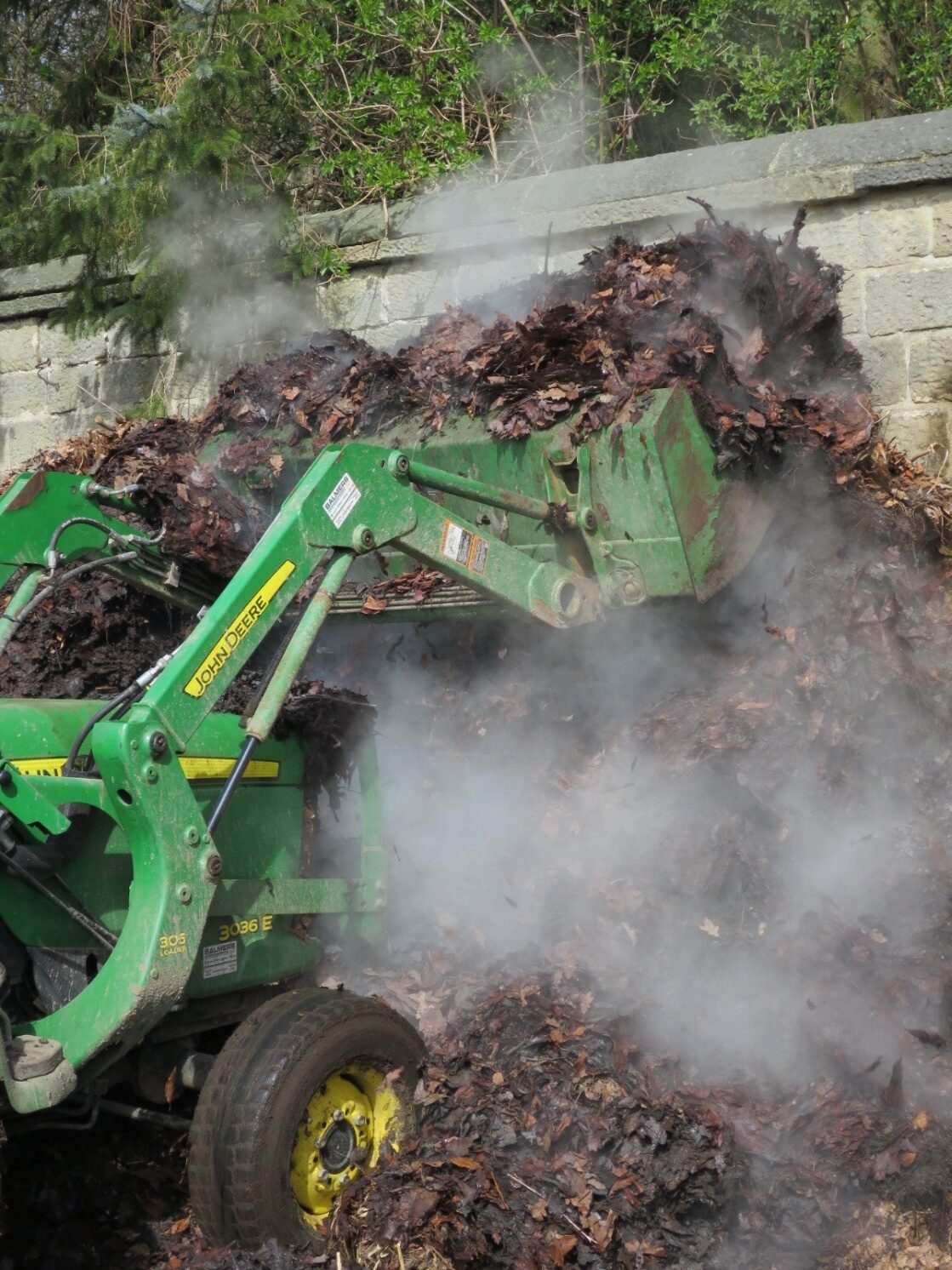
Huge piles of leaves collected from the grounds at Harewood being converted into our peat-free compost and mulch
Peatland habitats as blanket bogs, raised bogs and fens cover around 10% of the UK total land area.* Peatlands have formed over many thousands of years, they are essential terrestrial and aquatic ecosystems and support a unique biodiversity. Undisturbed peatlands also store huge amounts of carbon below ground, but the carbon is released into the atmosphere and habitats are lost when peatlands are damaged or disturbed through activities such as drainage, peat extraction, agriculture etc.
We don’t buy peat composts or use any peat in our gardens at Harewood. Instead, we produce our own composts and mulches. This is done on site through the recycling of a wide range of green waste materials, including garden clippings, prunings and especially from the many tonnes of fallen leaves, which we collect from all around the gardens and parkland every autumn. We are also looking carefully at the sustainability of our supply chains to ensure that the plants and products we purchase in the future are peat-free.
Biodiversity
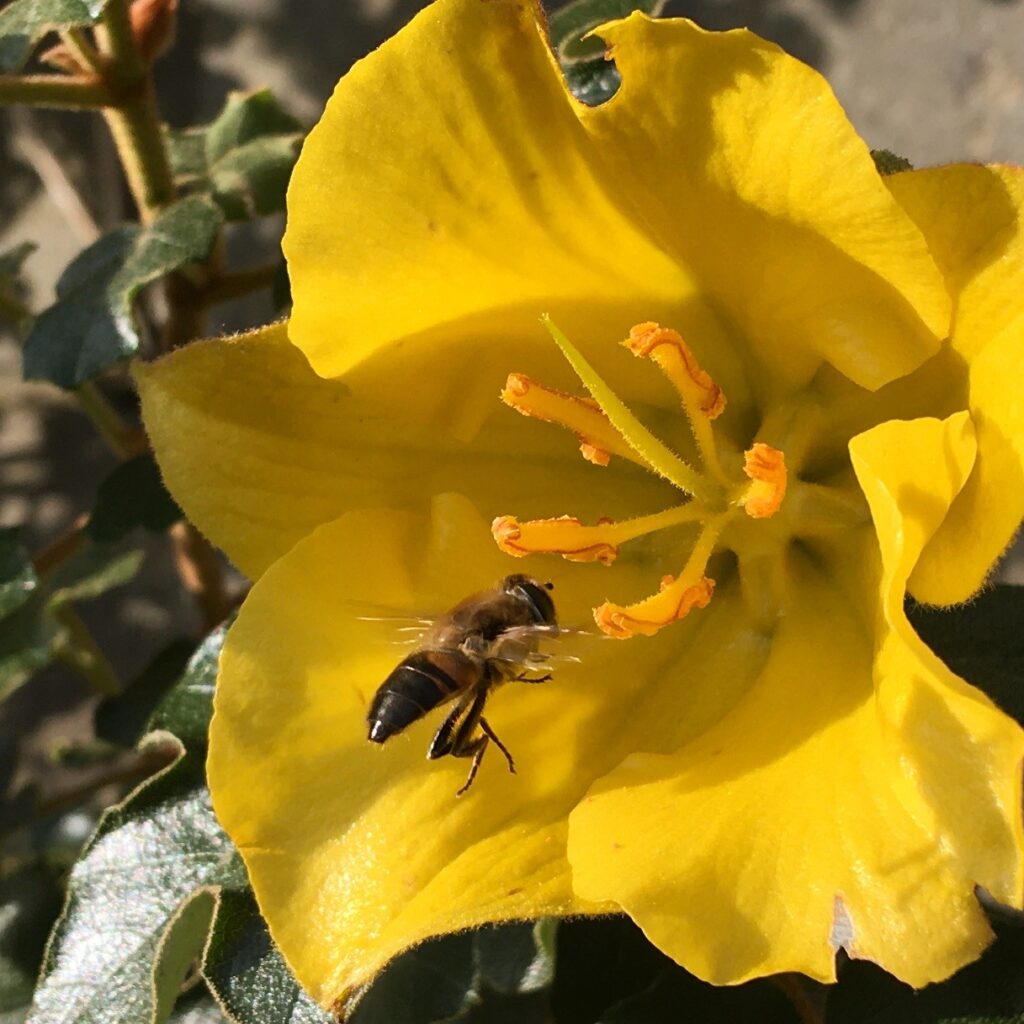
Harewood’s flower-rich gardens are beneficial to vast numbers of insect pollinators
Biodiversity loss through habitat destruction is a primary concern today and one which will be addressed during COP26.
As well as caring for the ‘world beneath our feet’ by protecting a myriad of soil-borne organisms through our ‘no-dig’ system, we work diligently to protect and enhance biodiversity throughout the gardens. Harewood contains a diverse range of habitats for an abundance of wildlife. Birds, fish and mammals, including bats, hedgehogs and otters live in the lakes, ponds, rivers, woodlands, grasslands and hedgerows, as well as the many old buildings, walls, ditches and even compost heaps and log piles. Our gardening practices support the stable food chains required to sustain this biodiversity. Vast numbers of bees, hoverflies, butterflies and moths visit the garden attracted by our amazingly rich flower borders, meadows and planting schemes. These provide a wealth of nectar pools and benefit huge numbers of pollinating insects. We create habitat piles for beetles and other woodland insects and adjust our mowing regimes according to the seasons so as to protect frogs, newts and toads emerging from the lake and migrating into the lakeside woodlands.
Trees
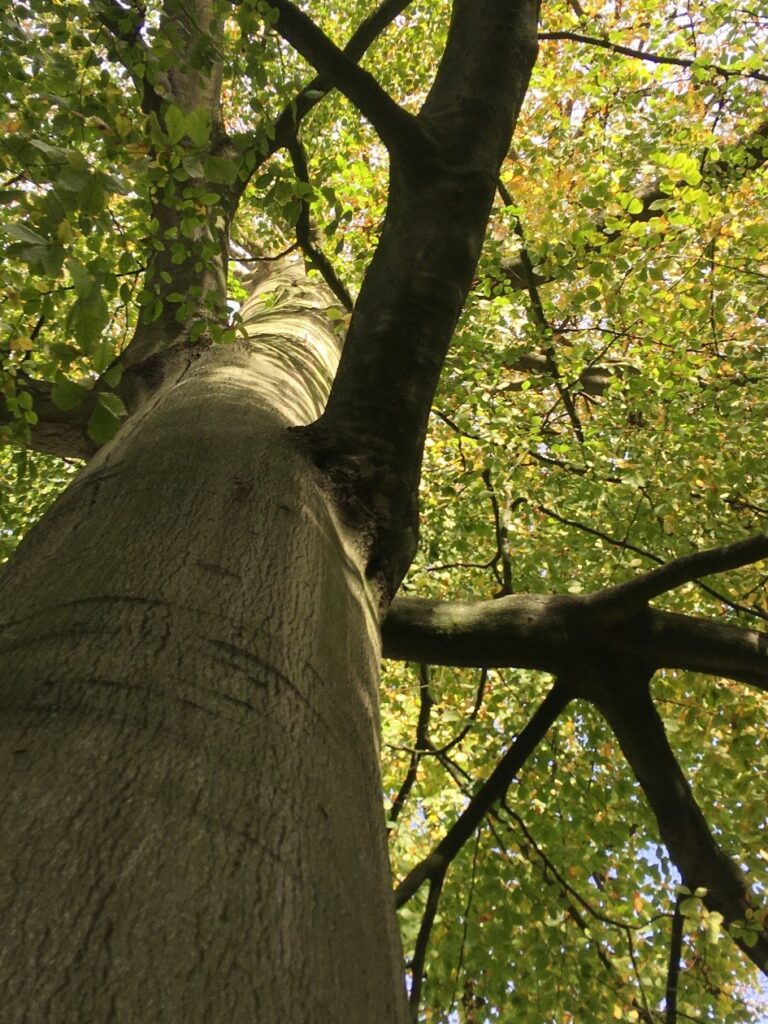
A gigantic veteran beech tree in the Lakeside woodlands at Harewood
Trees and woodlands are immensely valuable to us in the fight against climate change caused by increasing levels of atmospheric CO₂ and rising global temperatures. Many experts agree that trees are ‘our most powerful weapon against the devastating consequences of climate change and offer our simplest solution to helping avert the irreversible collapse of ecosystems’*. Global deforestation is a huge concern as habitats are destroyed and the planet’s ecosystems are put at risk. Alongside drastically reducing our CO₂ emissions, we simply must plant millions of trees to restore habitats and create the climate-cooling woodlands and urban greenspaces of the future.
Trees are champions of carbon capture. They absorb CO₂ from the atmosphere through photosynthesis and can lock it up below ground for many years, even centuries. Native broadleaf woodlands play a vital role in locking up hundreds of tonnes of atmospheric carbon per hectare.
Protecting ancient trees and established woodland ecosystems is essential. At Harewood, we plant trees for landscape continuity and conservation, as well as grow young trees from seed in our tree nursery. A large part of our work in the park and gardens is the monitoring and protection of veteran and ancient trees. Not only are these old trees carbon sinks, they are also unique ecosystems and therefore important habitats for wildlife. We responsibly manage and maintain a large number of mature trees at Harewood, thereby preserving our parkland trees and the habitats they support for future generations.
Water
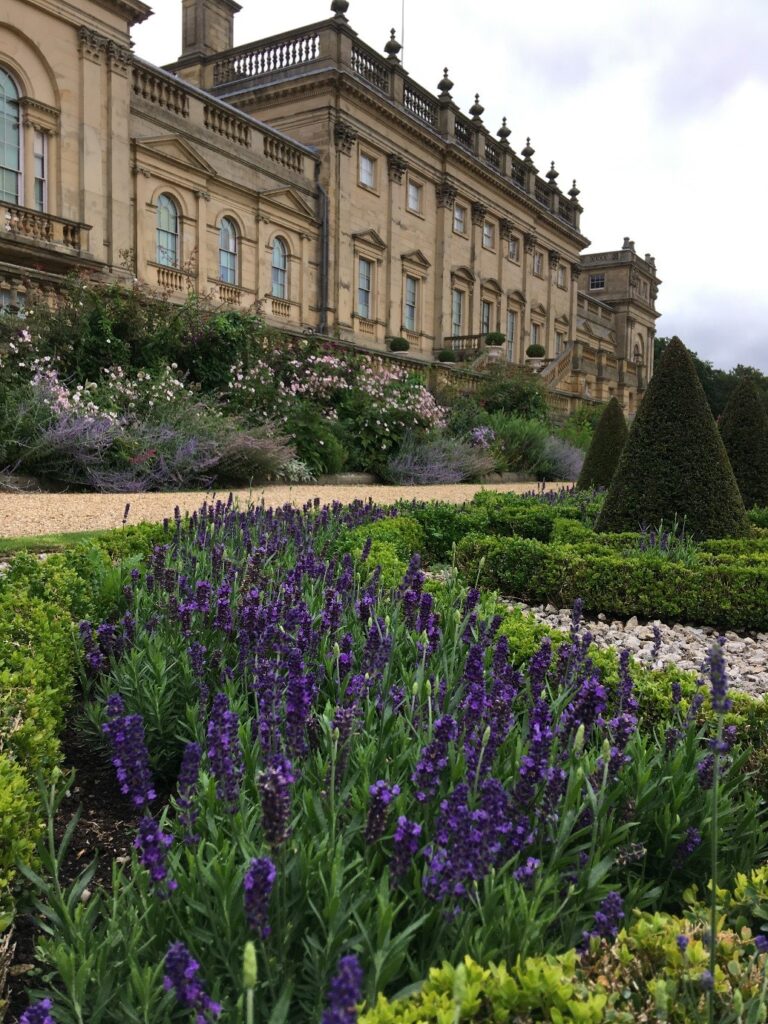
Drought-tolerant, perennial lavenders have replaced annual bedding displays at Harewood
Water supplies for public use are under pressure across the UK. It is reported that we need to reduce our demand and cut down on wastage to avoid many areas facing water deficits in the future. The amount of water available for households, industry and farming etc is limited and there is little capacity to meet increases in demand. Such pressures can affect the availability of water to a range of important habitats, such as bogs, fens and marshes, and place them under threat. Water resources will continue to be affected by population growth and climate change, so it is important that we keep the use of drinking water for the garden to a minimum and look to collecting rainwater wherever possible.
Here at Harewood, we have considerably reduced our consumption of water in the gardens. The irrigation system on the Terrace, which was installed in 1993 as part of the restoration project, has now been permanently decommissioned. The twice-annual planting of spring and summer bedding plants has been scrapped in favour of more drought-tolerant perennials, such as lavender. In the kitchen garden, we selectively spot-water our crops and keep this to an absolute minimum through the use of mulches: either compost, wool matting or cardboard. Mulching suppresses competing weeds and prevents the evaporation of soil moisture. We also have a rainwater barrel for collecting rainwater from the glasshouse roof and use watering cans fitted with a fine rose held low over seed drills to avoid wastage.
By using the ‘no-dig’ method, we also avoid soil erosion in the kitchen garden. When the soil is dug over and broken up, subsequent rainfall washes loose particles of soil, along with fertilisers, into land drains and eventually into water courses, where it forms as silt deposits. This ultimately affects the condition of the downstream freshwater environment. By adopting the ‘no-dig’ method and keeping watering to a minimum, soil erosion and siltation are considerably reduced.
Plastics
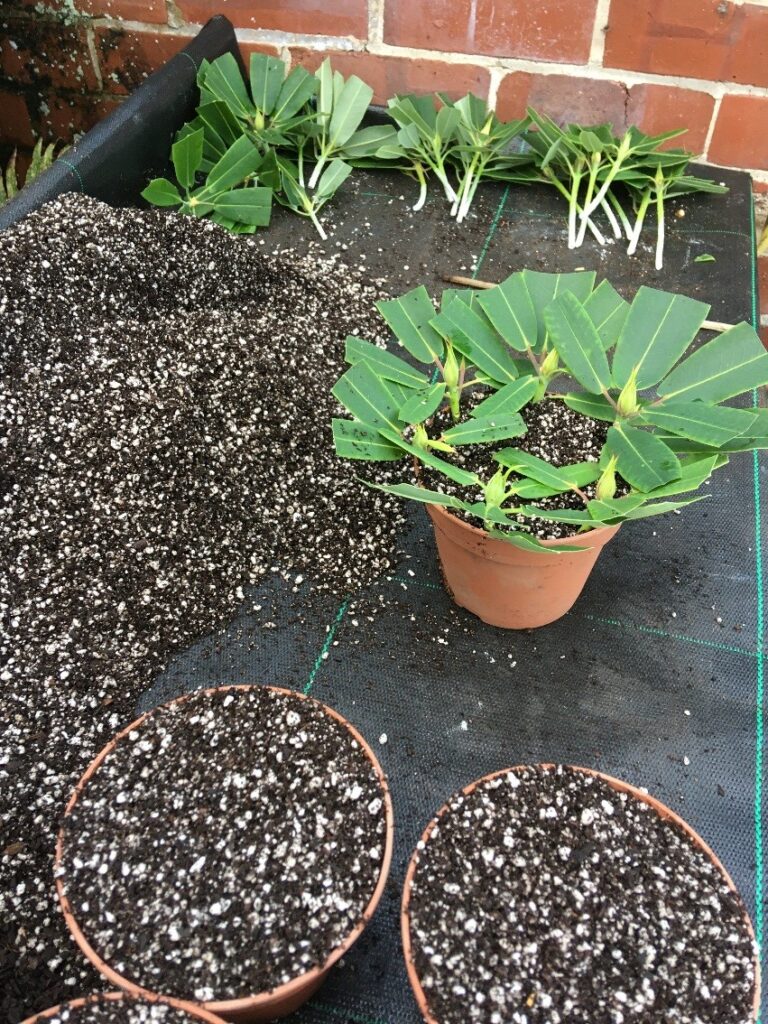
Plastic pots are continuously washed and re-used for plant propagation at Harewood
We all know how useful plastic is in the garden, but it is also widely known that plastic and the processes by which it is made are not good for the environment. Some plastics can take hundreds of years to break down and some can contaminate soil and water as they degrade, causing harm to wildlife.
The decision to plant drought-tolerant perennials at Harewood, such as lavender, as a change to buying in thousands of bulbs and bedding plants each year, was made entirely for environmental reasons. Drought-tolerant perennials not only save water, they reduce soil disturbance caused by regular changeover lifting and planting. This helps the ‘soil food web’ to establish and also prevents soil erosion. And as well as reducing our carbon emissions from vehicle transport, the thousands of lavender plants provide a benefit to insect pollinators and support biodiversity. But one of the main reasons for the change, however, was our desire to seriously reduce the amounts of plastic trays and pots coming into the garden. We also wash and re-use our plant pots and trays for growing a wide range of plants and vegetables from seed and cuttings at Harewood.
Fossil Fuels

Zero-emission robotic mowers powered by renewable energy being trialled in the grounds at Harewood
It is widely known that diesel and petrol-powered engines produce CO₂ emissions, which pollutes the atmosphere. In the garden, this includes lawnmowers, strimmers and hedgecutters. In large parks and gardens like Harewood, covering hundreds of acres, this range extends to include large and small tractors, ATVs (all-terrain vehicles) and chainsaws etc.
As well as investing in electric ATVs to facilitate the efficient transportation of staff and goods around the gardens, we are phasing out our petrol-powered hand-held equipment, such as hedgecutters and leaf-blowers and moving over to electric, battery-powered alternatives. This is expensive to do all at once so phasing is important, but the results so far are impressive. Not only are these machines re-charged using renewable energy produced at the Harewood Estate’s biomass energy centre, making them even more eco-friendly, they are safer for the staff to use at close quarters because they produce no toxic emissions. The acquisition of a battery-powered lawnmower for small areas this summer proved to be well worth the investment. We also invested in a battery-powered chainsaw, which offers our grounds team excellent performance without toxic emissions and no risk of spills or contamination from handling petrol. We recently had two models of robotic mowers on trial at Harewood and are looking at having further trials for cutting the larger areas. This could provide an environmentally-friendly alternative to using diesel tractors and gang mowers to cut the parkland areas and also remove the risks of soil compaction around the roots of our veteran trees.
Food
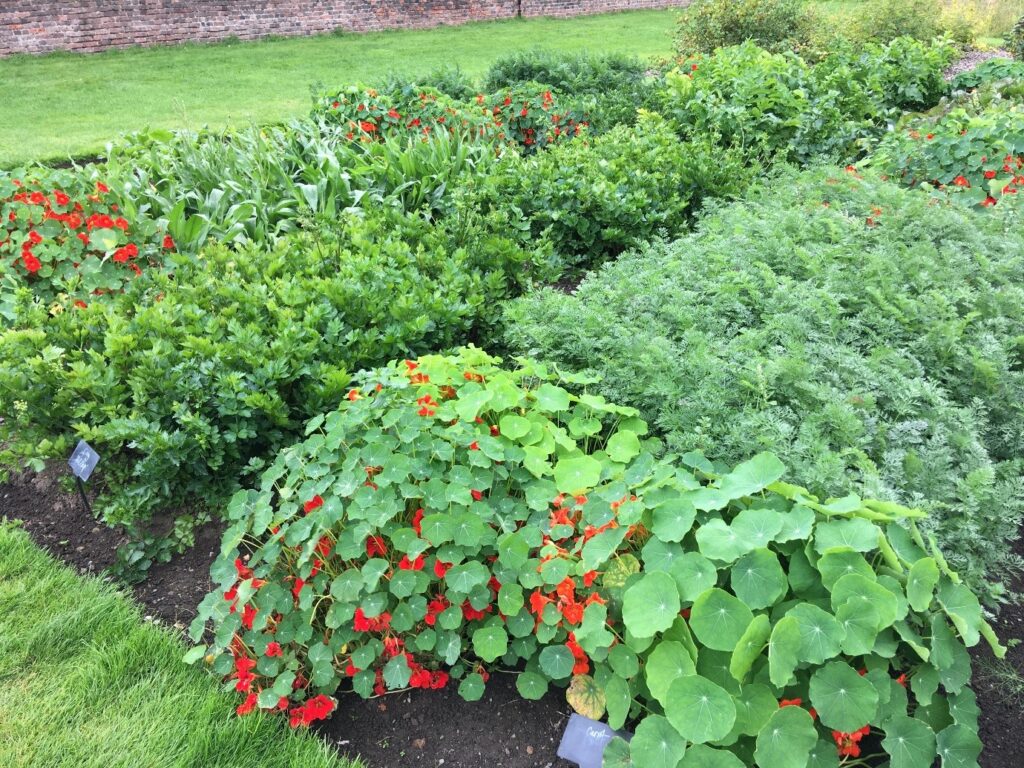
Organically-grown vegetables intermixed with flowers in the Harewood Walled Garden
Harewood offers people the opportunity to visit a place of great beauty and to engage in creative and thoughtful activities, which provoke new perspectives on art, nature and life. Health and wellbeing, the environment, sustainability and biodiversity is at the heart of what we do here in the park and gardens, and food plays an extremely important part in the overall experience of Harewood today. The food journey doesn’t begin at the table, but in the Walled Garden where it is grown using organic methods and with considerable concern for the environment and the impact on climate change. The soil is carefully nurtured using ‘no-dig’ methods to protect the soil food web, lock in carbon, save water and prevent siltation. We grow fresh, nutritious vegetables, fruit and herbs without the use of pesticides and intersperse our plots with nectar-rich flowers for bees and other pollinating insects.
Produce is harvested fresh and transported half a mile by electric vehicle to the Courtyard restaurant. The chefs take all that we can produce from the Walled Garden and also creatively use a range of farm products and foraged food from the Harewood Estate, thereby seriously reducing the food miles of their overall stock. The vegetables, fruit and herbs from the garden are delivered without any packaging and all stackable crates are washed and re-used. Any damaged or surplus fruit or vegetables from the garden are sent to the Bird Garden for feeding the birds and animals, and all trimmings are composted and returned to the garden as mulch, thereby creating a zero-waste system.
-Trevor Nicholson, Head Gardener
*Sources
http://www.wlgf.org/garden_resource.html
https://www.rhs.org.uk/garden-inspiration/get-gardening/2021-gardening-predictions
https://www.iucn-uk-peatlandprogramme.org/about-peatlands/uk-peatlands
https://www.woodlandtrust.org.uk/trees-woods-and-wildlife/british-trees/how-trees-fight-climate-change/
